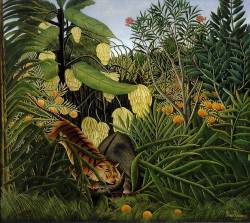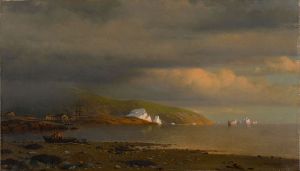 Evolution has always been more controversial socially than scientifically. After Darwin published the Origin, the idea that all species descended from common ancestors was quickly accepted by most biologists (though his proposed mechanism of evolution, natural selection, remained controversial until the 20th century). Socially, however, evolution was and remains difficult for many people to swallow. The literalist beliefs of religious fundamentalists of course conflict with evolution. But even among those who don’t have a particular religious axe to grind, discomfort is not uncommon. Evolution in practice is brutal: we posses our unique adaptations – our brains, our opposable thumbs, our ability to talk, to socialize, to feel, see, and touch – thanks to the selective death of billions of organism over eons.
Evolution has always been more controversial socially than scientifically. After Darwin published the Origin, the idea that all species descended from common ancestors was quickly accepted by most biologists (though his proposed mechanism of evolution, natural selection, remained controversial until the 20th century). Socially, however, evolution was and remains difficult for many people to swallow. The literalist beliefs of religious fundamentalists of course conflict with evolution. But even among those who don’t have a particular religious axe to grind, discomfort is not uncommon. Evolution in practice is brutal: we posses our unique adaptations – our brains, our opposable thumbs, our ability to talk, to socialize, to feel, see, and touch – thanks to the selective death of billions of organism over eons.Consolation Darwin. Supposedly for relaxation he read novels. But he had a requirement: they couldn't end sadly. If he happened on one, he flung it furiously in the fire. True or not – I gladly believe it. Roaming in his mind over so many times and places looking back on all the extinct species, such triumphs of strong over weak, so many tests of survival, sooner or later all in vain, that at least in fiction and its micro-scale he had a right to expect a happy ending. And so necessarily: sunrays behind a cloud, lovers together again, kin reconciled, doubts dissolved, faith rewarded, fortunes recovered, treasures dug up, neighbors regret their mulishness, good names restored, greed put to shame, old maids married to respectable ministers, schemers expelled to the other hemisphere, forgers of documents cast down the stairs, seducers of virgins hurrying to altars orphans taken in, widows embraced, pride humbled, wounds mended, prodigal sons invited to the table, the cup of bitterness poured into the sea, tissues wet with tears of reconciliation, universal singing and music-making, and the puppy Fido, lost already in the first chapter, let him run home again and bark joyfully.
Translation from the Polish by Michael A. White (2016)
Image: “Fight Between a Tiger and a Buffalo”, Henri Rousseau (1908), via Wikimedia Commons.
Filed under: Follies of the Human Condition, Uncategorized Tagged: evolution, science poetry, Sunday Poem

 Why are 17th century poets like John Donne, George Herbert and Andrew Marvell called ‘metaphysical’ poets? You can
Why are 17th century poets like John Donne, George Herbert and Andrew Marvell called ‘metaphysical’ poets? You can 
 Why does nature move us? Driving through the South Dakota Badlands this summer was a moving experience. The bare, jagged landscape evoked feelings of calm, happiness, and awe — how can a bunch of rocks have such emotional resonance?
Why does nature move us? Driving through the South Dakota Badlands this summer was a moving experience. The bare, jagged landscape evoked feelings of calm, happiness, and awe — how can a bunch of rocks have such emotional resonance? It’s National Poetry Month, and we’re continuing our focus on the
It’s National Poetry Month, and we’re continuing our focus on the